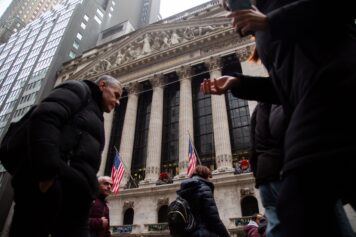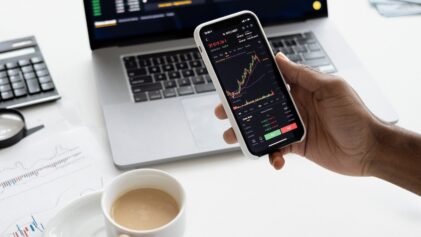By Claire Ballentine
Are we heading for a recession or did we just avoid one?
That’s the question everyone’s asking after gross domestic product rose at a 2.6% annualized rate in the third quarter, according to a preliminary estimate Thursday from the Commerce Department. The uptick follows two consecutive quarters of contractions, which some consider a recession.

Resilient consumers and businesses are largely behind the latest jump, with personal consumption — the largest contributor to the economy — increasing at a 1.4% pace, which was better than forecast but also a slowdown from the prior quarter.
Although economic growth is usually a good sign, some market watchers are worried that the continued strength means the Federal Reserve will have to keep hiking interest rates for longer to get inflation under control, which could ultimately lead to a slowdown.
It’s all contributing to a very strange economic situation: Consumer prices are still rising, household spending is coming under pressure, and surging mortgages rates are starting to cool the housing market, even as unemployment sits at a five-decade low. Meanwhile, major companies are sending conflicting earnings messages, leaving the stock market confused.
No wonder people are interpreting Thursday’s data in different ways, with President Joe Biden saying it shows the economy is “continuing to power forward,” while economists at Morgan Stanley said the third quarter is likely to mark a peak in growth. Meanwhile, McDonald’s Corp.’s chief executive officer said Thursday he expects a mild-to-moderate recession.
“It’s nice to see a positive GDP number, but I don’t think we’re in the clear yet, economically speaking,” said Brittany Brinckerhoff, financial advisor at Hilltop Wealth Advisors in North Carolina. “With inflation still high, the Fed is still positioned to keep raising interest rates and it’s likely we’ll see economic growth continue to slow as a side effect from that.”
Here’s what you need to know about this strange moment for the economy:
Are We in a Recession?
Most agree that we’re not — at least not yet. Although some define a recession as two consecutive quarters of declining GDP, which happened earlier this year, the National Bureau of Economic Research technically declares recessions in the US. It usually takes them about a year to make such a call.
The definition of a recession is “a significant decline in economic activity that is spread across the economy and that lasts more than a few months,” according to the NBER.
“The definition is subjective and there are no fixed rules in determining a ‘significant decline,’” said David Huebner, financial advisor at Huebner Financial Planning. “A 1.6% decline in the first quarter of 2022 followed by a 0.6% decline in the second quarter is not a significant decline, it’s arguably flat.”
Will We Be Soon?
Market watchers and economists think it’s increasingly likely.
Recently, Goldman Sachs Group Inc. CEO David Solomon said economic conditions are going to “tighten meaningfully from here,” while Franck Petitgas, head of international operations at Morgan Stanley, said 2023 looks “a little dicey.”
Bloomberg Economics model projections recently showed that a US recession is effectively certain in the next 12 months, and markets are pricing in a downturn as well.
“I think a recession still hasn’t started yet, but it’s highly likely a recession will probably come in 2023,” said Chris Diodato, founder of WELLth Financial Planning in Palm Beach Gardens, Florida.
What Will The Fed Do Next?
The strong GDP figure for the third quarter means the Fed might need to continue tightening aggressively, according to Chris Zaccarelli, chief investment officer at Independent Advisor Alliance.
“The Fed really has their work cut out for them — the economy isn’t slowing, consumers are still spending a lot and inflation isn’t going to drop back down to 2% anytime soon,” he said.
For its meeting next week, the central bank is expected to raise its benchmark interest rate by 75 basis points for the fourth straight meeting. Investors are predicting they’ll hike by 50 or 75 basis points in December and then end the tightening in early 2023 around 4.9%.
However, the Fed could change course if economic data remains strong, said Alina Fisch, founder of Contessa Capital Advisors in New York.
“The Fed has seemed determined to encourage a recession until inflation is clearly under control,” she said.
What Can I Do to Prepare?
There’s no need to radically alter your investment strategy just because of the GDP number, experts say.
But there are some areas that are starting to look more attractive. Diodato is moving his clients’ stock allocations more toward health care, utilities and consumer staples sectors, which tend to be recession-resistant. High-quality bonds are also starting to look appealing.
“I think we’re getting closer to that point where bond investors will be rewarded for this patience,” he said.
Municipal bonds, which aren’t subject to federal or state income taxes, are starting to offer better yields. For instance, one-year muni bonds with a triple-A credit rating provide a yield of almost 3%, compared to nearly zero last year. Treasury yields — one of the safest investments out there — are also moving higher.
One of the best-returning investments right now are US Series I savings bonds, which currently offer a 9.62% interest rate that is expected to drop to 6.47% starting Nov. 1. Demand for those bonds was so high this week that the TreasuryDirect website nearly stopped working.
More stories like this are available on bloomberg.com.




